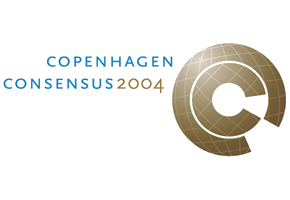Background
A number of global challenges call for international solutions. Each year the United Nations, governments, philanthropists and NGOs spend large amounts of money in an attempt to improve living conditions around the world.
The Copenhagen Consensus aimed to take stock of current global challenges and to come up with a list of the best solutions. The core idea is that with scarce resources to tackle the problems of the world, prioritization is necessary. We need to know what we should do first.
If the world decided to spend $50 billion on improving global welfare, which projects should we start with?
The project focused on areas where the resources of developed nations are spent with the intention of 'doing good' outside those nations. Among many other initiatives, this includes cross-border environmental spending, peace-keeping attempts to resolve conflicts, and the effort to stamp out HIV/Aids.
The list of ten challenges considered by Copenhagen Consensus was developed in conjunction with an expert group of economists, and with input from focus groups. A description of this process can be found in 'Global Crises, Global Solutions: Second Edition', (ed. Lomborg, 2004), the book that contains all of the 2004 Copenhagen Consensus research and findings. Here on the Copenhagen Consensus Center website, you can find all of the final draft research papers.
Two sets of research papers were commissioned. The first set, known as 'Assessment Papers', outline the scope of a challenge and present empirically based cost-benefit-analysis studies of the highest academic standards within that challenge. The second set of research papers are known as 'Perspective Papers.' In these, a second set of experts provide an alternative expert point-of-view, reviewing relevant research that may have been left out of the original paper; and providing alternative interpretations and a review of the findings in the Assessment Paper.
To identify which solutions should be pursued first, the Copenhagen Consensus convened an Expert Panel of eight renowned economists. They gathered in Copenhagen in May 2004 and heard presentations from all of the key research authors. They were asked to provide an answer to the question:
The Expert Panel's findings are available in full in 'Global Crises, Global Solutions: First Edition (ed. Lomborg, 2004). At this website, you can also read the Outcome Document, representing the Expert Panel's consensus findings.
To provide another perspective on these issues, a Youth Forum was held, where future decision-makers from around the globe gathered and heard the same evidence as the Expert Panel, and produced their own answer to the project's central question.
Copenhagen Consensus attracted global media attention, and the attention of decision-makers and philanthropists. Denmark's government spent millions more on HIV/Aids projects, which topped the Expert Panel's 'to do' list.

